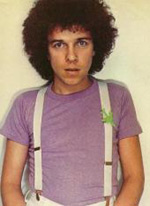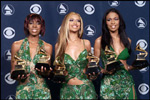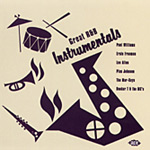Keeping It Real
| |

| Here's a good one: Leo Sayer won a Grammy in 1977 for 'You Make Me Feel Like Dancing'. The punchline? It was voted the 'Best R&B Song' of the year! Ho-ho-hee-hee. Funny? Not for The Commodores and Harold Melvin And The Blue Notes, who were also nominated for 'Brick House' and 'Don't Leave Me This Way'. So what is 'R&B'? And how come the white English kid got the nod over those two with a dumb little sub-Disco ditty like that? You'd have to ask those who were members of the National Academy of Recording Arts and Sciences, I suppose. But what did they know about musical categories? By '77 they'd expanded 'R&B' to five sections, perhaps because they hadn't bothered to create a 'Soul' one. Anything that wasn't Rock, Country, Classical or Jazz, therefore, got thrown in the 'R&B' bin. Everyone's asking questions about R&B today. By 'everyone' I mean, of course, the guy who asked me what kind of R&B I was listening to, exactly, and the girl who wanted to know what R&B is, and the Mod we spoke to in a bar who complained about the lack of R&B in clubs. Then there's Alistair, who expresses his distaste for modern R&B. After doing some finkin' about R&B over the last few weeks, I've concluded that, yes, it is simply a matter of either going with the modern flow or preferring old stuff. God, did it really take me so long to figure that out? Yes. Well, you see, I had tried, at first, to tie the whole history up in my mind and compare the differences between the R&B of Then and Now before trying to discover what it was that some didn't like about the new version. I went through whole pages of thought regarding the history, the subject matter, the style etc. Then, after all that, all I could seriously conclude is that some prefer their R&B old, and some new. Quite simply, it's a matter of choosing live musicians playing in the old style over hi-tech divas. It's the music!! Explaining why you don't like something can be harder than saying why you do, can't it? God, I am so profound. R&B today? 'Well, it's crap, innit?' (imaginary response). But why is it 'crap'? 'It just is!' Pure retro devotees have no need to explain themselves, it's obvious that they're having no truck with anything modern. Perhaps they did when they were young but sometime during the 'growing out of that' phase they locked into the Past. I've written about All That, in the recent Past, so I won't go there again. The modern application of the term 'R&B' sits logically in the Grammy tradition of attaching tags more or less casually - well, it's black music, isn't it? Only when you separate the letters and give them their full names does the term fall apart. Oh sure, they got 'rhythm' now, of the heavily engineered variety, but have they got the 'blues'? Back in, say, '65, a black singer didn't have to sound like he or she was a tortured soul to produce R&B that deserved the name because it simply relates to a form that evolved, like all music, into something else. Moving closer to original sounds, R&B back then still had the edge, or the indefinable something that made the songs and the way they were sung sound heartfelt. The mechanics of the music become more complicated the closer you look. Hard swinging big bands like Basie's were playing R&B riffs back in the 30s, sounds like to me, but it wasn't until the small post-war groups formed, went electric and got vocalists, that the sound we know, historically, as R&B started to emerge. One theory goes that the blues singers simply has to shout an' holler to make themselves heard over the guitars and heavy drum beat. Black R&B was Rock'n'Roll before the term was invented and, as we know, it took Elvis and his love of R&B to blow the whole thing wide open. R&B gave birth to everything we know as 'modern' music, virtually, if you take The King as the founder (in the world-wide popular sense). It worked again ten years later by inspiring the UK generation of The Who, Stones and Beatles. |

| The modern version sounds terribly contrived compared to all that down home music-making. It all comes across as a carefully manipulated career move that's as well-groomed as the hair and make-up. The vocals appear to be the result of computers programmed to produce 'gospel' or 'soul'. The technical ability is there, but the natural application is lacking. By 'natural', I mean the sound you heard when Aretha opened her mouth. Today seems to be all 'style' and, dare I say, no substance? Blame Whitney. In his book, Blues People, Leroi Jones talked about jazz musicians and others who had 'run through blues and discarded it on the way'. He claims they had to because 'It was one of those ugly reminders that they had once been outside the walls of the city'. The trouble with a lot of crossover success, as he also points out, is that the winners end up making sounds which become 'indistinguishable from the commercial shallowness of American music'. No longer 'outside', the new school R&B singers have dumped grits'n'gravy for Gucci'n'gold because...who needs that shit, these days? The road to big time success (and a Grammy) does not involve raw power, rootsy feeling, rough-edged bands, high energy or low-down blues. Technology goes hand-in-hand with materialism. It makes sense. The best producer money can buy becomes a status symbol, and the sound must be as sharply defined, as 'perfect', as the most efficient car. As for the obligatory Sex, well, that's not exactly new, but the opportunity to test the limits of hooker chic expand as notions of acceptability change. Dignity is such an old-fashioned concept, isn't it? What sells are chicks in next-to-nothing because that's the fantasy. On this one, I'm dangerously close to sounding like a member of black America's Islamic movement. Put it away, missus. What I think about modern R&B matters not one bit because the whole world (seemingly) still loves it and I stay within my circle, my world-within-worlds that keeps faith with the 50s and 60s version. There's even a night in London called 'The Real R&B' - the title being a bit of a wind-up, but I've not yet seen anyone there who looks like they went expecting 'bootylicious' action all night. There's a night in Manchester called The Hideaway, which gets a plug on the recent Kent release, New Breed R&B. One of the founders suggests that the night became a refuge for exiles from other scenes (hepcats, Northern fans). This makes sense. People are always looking for alternatives within these tiny worlds. Some of us aren't satisfied with token R&B slots squeezed into all-night Northern soul. Perhaps there's a momentum gathering that will produce London's first proper R&B night ('The Real R&B' also presents dancefloor jazz). |

| Some Mods go for R&B, proper, and it's ironic that the late-50s sound offers the same roots as the beat that drove Rockers wild. But R&B was such a mixture of influences even then (Gospel, doo-wop, blues, jazz). For a fine example of the sound as it was in the 50s, I recommend a recent Ace release, Great R&B Instrumentals. This shows off various styles, from the horn-honkin' rock'n'roll of Joe Houston's 'All Night Long' (1954) to the super-cool stroll of Ernie Freeman's 'Jivin' Around', made a year later. The Kent comp, meanwhile, moves more into the soul-blues sound, but still supplies some tougher stuff courtesy of the Bobby 'Blue' Bland/Ike Turner tune, 'Love You Baby', and Arthur K Adams' 'Let Your Hair Down'. It perfectly demonstrates the shift towards the soulful 60s which still kept in touch with the blues. For examples of further mutations in the R&B field, try finding Pass The Soul - 25 Searing Soul Rockers. With no catalogue number or track details other than titles and artists, this less-than-legal selection absolutely delivers the goods as promised (although not the royalty cheques). The real nitty gritty runs right through all 25 tracks in one form or another, shot through with blues-funk-soul-jazz...jokes...jive talk. There are too many showstoppers to mention, but some of personal faves are 'Let It All Hang Out' by Timmy Norman And The O'Jahs, 'Bullfight #2' by Chuck Edwards (Bo Diddley meets Booker T?), and Johnny Otis's 'Banana Peels'. In a modern business that's more restricting than the gold hot pants worn by today's R&B divas, there's no room for the rough cut expression or pure fun had by past performers. Ironically, the more freedom of access (into the city of Success) allowed, the less exuberance is in evidence. Perhaps they're too conscious of the rewards to risk letting their hair down. © Robin Tomens 2001 |